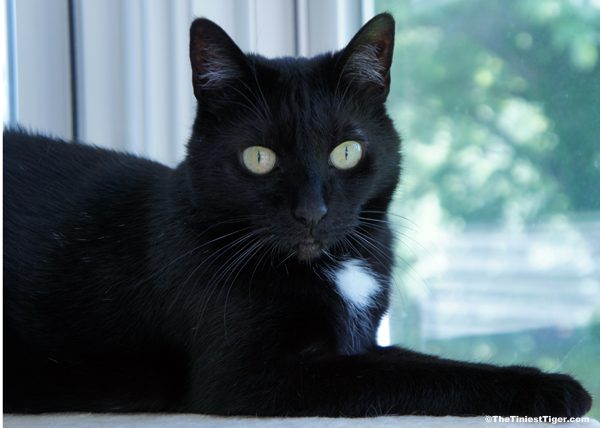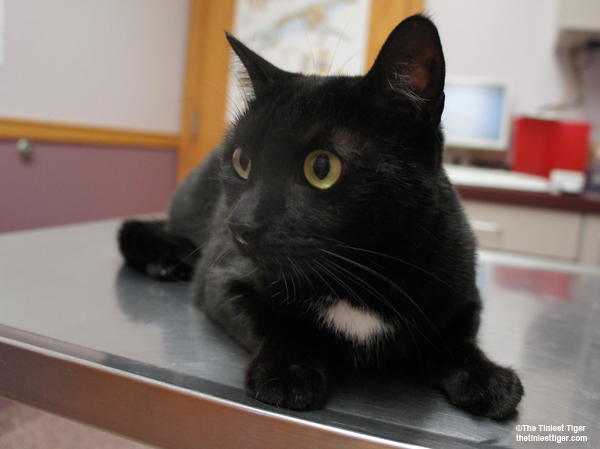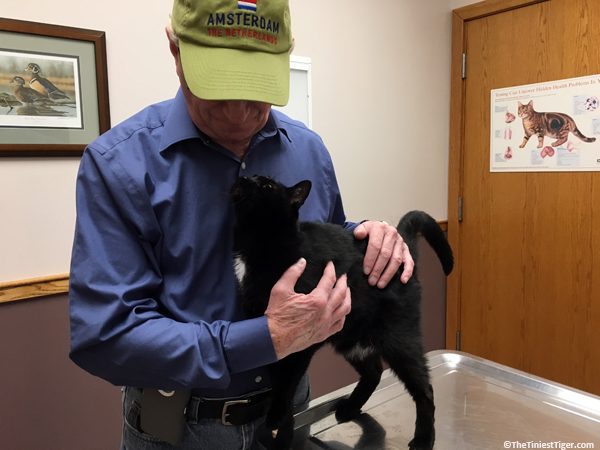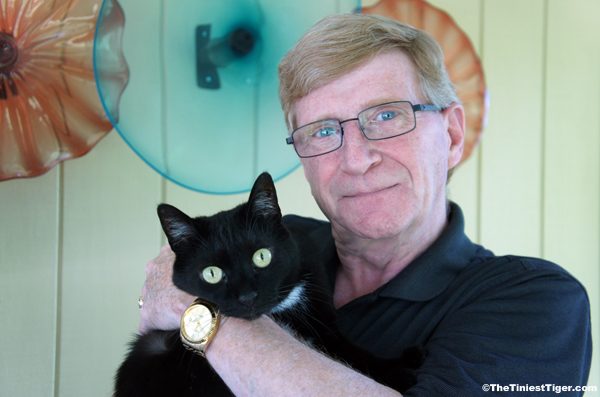
Mercy
Mercy has hypertrophic cardiomyopathy (HCM). When we took Annie, Eddie and Mercy in for their wellness exams, we decided to run the IDEXX SDMA test for Mercy. He is 10 years old and we wanted to get an idea of his kidney function as well as how he is doing overall. We ran the test but the results were not what we expected! Mercy’s kidney health is perfect and in fact quite remarkable for a 10 year old cat. But the test also showed an abnormal Cardiopet proBNP. Mercy’s results show on the low side of high but enough to cause concern. NT-proBNP concentration is compatible with increased stretch and stress on the myocardium. To understand better and get a more accurate understanding of cardiac structure and function, echocardiography is recommended.
Hypertrophic Cardiomyopathy (HCM)
Mercy’s echocardiogram showed an early stage of hypertrophic cardiomyopathy (HCM). HCM is the most common heart disease in cats. The condition results in hypertrophy or thickening of the heart muscle which, in time, creates increased stiffness of the heart walls (muscle) resulting in poor cardiac function during the relaxation phase of the cardiac cycle (diastole). As this condition worsens, the thickened heart muscle can cause obstruction to blood flow leaving the heart via the aorta. This increases the effort needed to pump blood out of the heart during the contraction phase of the cardiac cycle (systole).

Mercy at the Morris Veterinary Clinic
The Cause of Hypertrophic Cardiomyopathy (HCM)
HCM is thought to be an inherited disorder caused by a genetic mutation of the genes that control heart muscle growth. The HCM mutation is determined in the Maine Coon and Rag Doll breeds. The genetic defect has not been identified in other purebred or domestic types of cats. In humans, more than one genetic mutation has been identified as causing HCM so it is likely to be true for cats as well.
Symptoms of Hypertrophic Cardiomyopathy (HCM)
The symptoms of HCM vary depending on the degree of severity and perhaps on the different genetic mutations in individual cats. Cats are most often diagnosed when they have no symptoms but when a veterinarian detects a heart murmur or an irregular heart beat during a wellness exam. When symptoms arise, they may include signs of congestive heart failure.
- Increased respiratory rate
- Labored breathing
- Shortness of breath
- Lethargy
- Appetite loss
- Change in behavior like hiding
- Sudden loss of one or more legs due to blood clots obstructing blood flow
- Fainting spells from an irregular heart rhythm
- Stroke
- Acute sudden death may occur without any symptoms.
Treatment of Hypertrophic Cardiomyopathy (HCM)
The treatment for cats with HCM vary with the severity of the condition at the time of detection. Current medications include drugs that slow the heart rate and improve relaxation of the heart (beta blockers or calcium channel blockers), drugs that thin the blood to prevent blood clots from forming (platelet inhibitors, anticoagulants), and diuretics to control abnormal fluid buildup. Your veterinarian will determine the best treatment based on your cat’s condition.

Mercy looking for comfort from Paul
Mercy’s Heart
Mercy was not showing any signs of respiratory distress but the blood work showed signs of a heart issue. The results of the echo showed the beginning stages of HCM and the plan of care is to take atenolol
Atenolol is a beta-blocker that affects the blood flow through arteries and veins and is used to treat chest pain and high blood pressure. Mercy’s prescription is to take a 1/4 pill every 12 hours. Dr. Guinan thinks we caught this early, so there is a better chance the atenolol will help Mercy and might even keep the condition from worsening.

Paul and Mercy
Wellness Exams are So Important
I know I keep repeating this, but if Mercy didn’t go for his wellness exam and the IDEXX SDMA panel, we wouldn’t know he was experiencing these health issues. Please take your cats in for their check ups and if your cat is getting a little older, think about running the IDEXX SDMA panel to check their wellness.
Thank you for all the kind words and prayers for Mercy. We really appreciate your kindness.
We lost Cuzz to this. If only we’d known she had it,
thank goodness you did this, I hope that you caught it earlier enough.
Lots of love and health for dear Mercy.
Mercy, Annie & Eddie are truly fortunate to be part of your family. I really appreciate how you share such valuable information.
While it can be distressing to get a diagnosis of illness for our dear friends, I have been fortunate to have a vet team who would give me information, honest evaluation of options and risks and a gentle, loving goodbye after a much longer than estimated time.
Prayers for your handsome boy!
I’m sending lots of purrs to Mercy. I’m glad you uncovered his HCM early. My human has asked about the IDEXX SDMA panel at the clinic we go to, but they don’t do it, and didn’t seem all that interested in pursuing it. They are like that about a lot of things. My human had to talk to them weeks in advance to make sure they gave me the three year Purvax rabies vaccine my last visit. Usually they only give one year to cats.
love and prayers for all of you — especially Mercy. I lost 2 kitties to this disease. It was a very sudden attack that took both of them instantly (they were brother and sister, but passed 5 years apart). . .???
Purrayers for sweet Mercy ! He is certainly a handsome boy. Glad you caught it early.
I’m SO glad to read that the vet thinks you caught this early. Sending lots of positive thoughts and prayers for Mercy. I’ve never heard of that particular test, but Newtie’s due for her annual exam in late September. I’ll be sure to bring it up. Thanks for sharing such comprehensive info. Scritches to Mercy. <3
dood ~~~~ we R happee thiz waz caught earl lee on; N we send best fishez two ewe for healthee, happee dayz a head… N de manee blessingz oh St Francis az well ~~~~~~ ?????
So sorry about Mercy’s diagnosis… my own cat was acting funny about 1 1/2 years ago and stopped eating. An exam showed a very enlarged heart but blood work showed nothing wrong with the heart tissue. It’s thought he may have a leaky valve. He’s on 1/2 table of benazepril each day and doing very well. Eats every couple of hours when I’m home, takes 5-6 hour naps… He was only 5 1/2 years old when diagnosed. I may ask about the test Mercy had to see if my cat needs it or further tests. Thanks so much for sharing about Mercy.
Definitely going to ask to run an IDEXX SDMA panel at the next Wellness visit for our two boys. A heart murmur was detected in our Dante (domestic shorthair) upon adoption. At one year, it was recommended that we do an echocardiogram. He turned five this past June and we take him every year for his echo. He sure doesn’t like the extra visit and we hate making him unhappy, but dammit, he’s going! and your post is one of the reasons why. Thank you!
Hello, So glad for a positive update for Mercy, and he will be in my thoughts for the best of health. Yes it is important for our kittys to have regular checkups, that way things can be found and taken care of. I have read that most cats will try to hide their discomfort, and if we take them to the vet, it will pinpoint the problem, if any.
Thank you, have a great week.